-
Canvas Grocery Tote Bags
Regular price from $14.99Regular priceSale price from $14.99Unit price per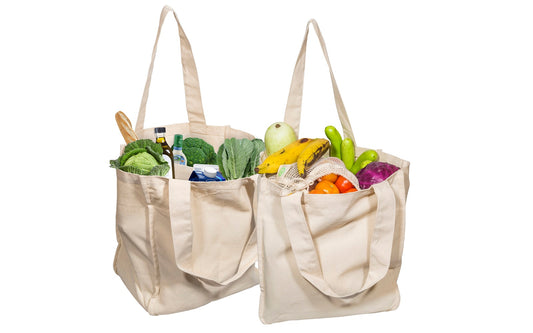
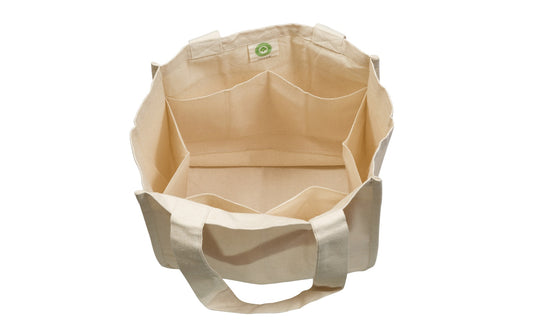
-
Collapsible Grocery Shopping Bags
Regular price from $34.47Regular priceSale price from $34.47Unit price per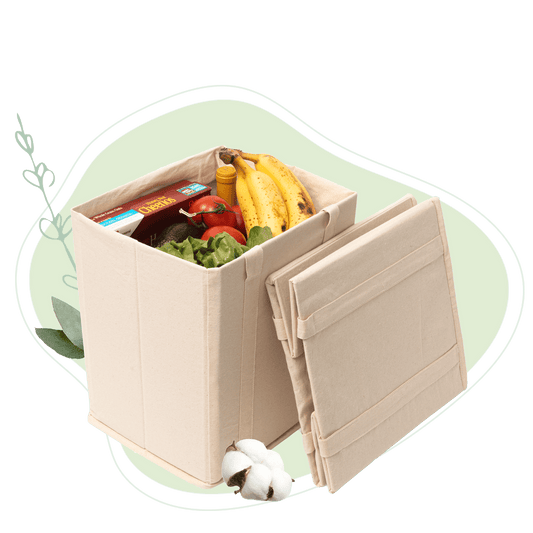
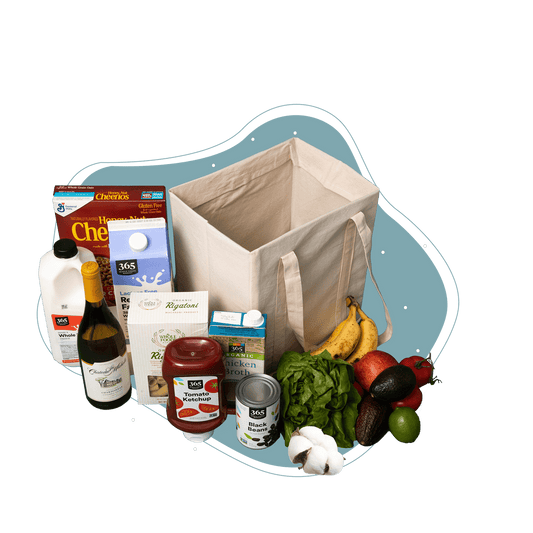 Sold out
Sold out -
Mesh Shopping Bag
Regular price from $13.99Regular priceSale price from $13.99Unit price per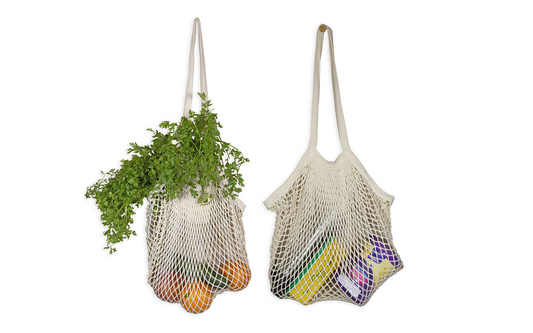
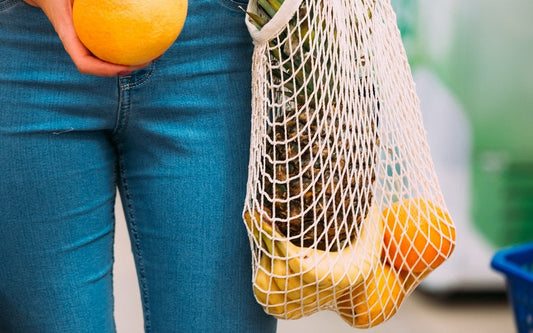
-
Canvas Wine Tote
Regular price from $14.99Regular priceSale price from $14.99Unit price per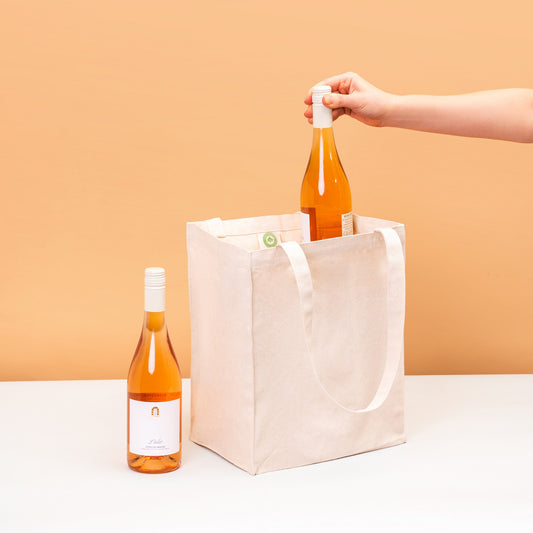
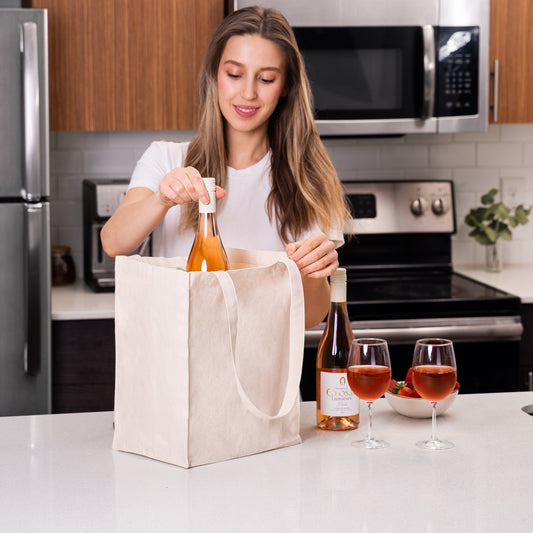
-
Extra Large Canvas Tote
Regular price $19.99Regular priceSale price $19.99Unit price per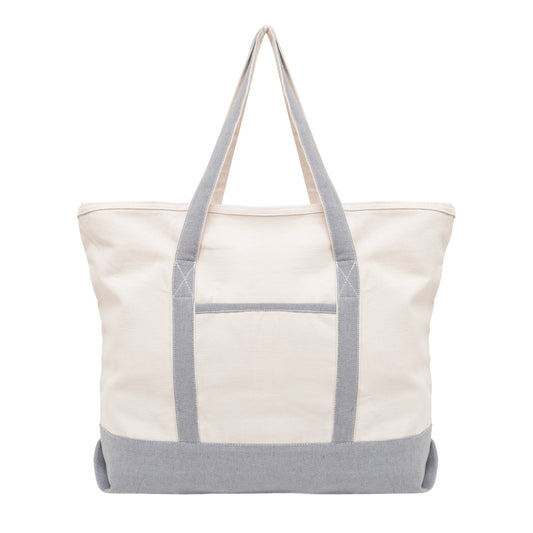

-
Canvas Jumbo Tote Bag
Regular price from $16.99Regular priceSale price from $16.99Unit price per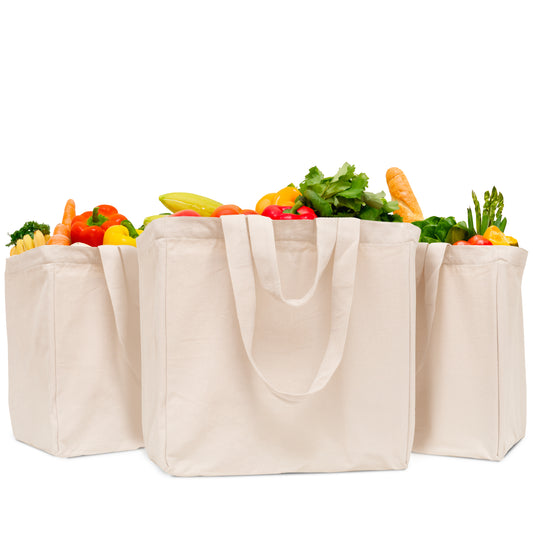
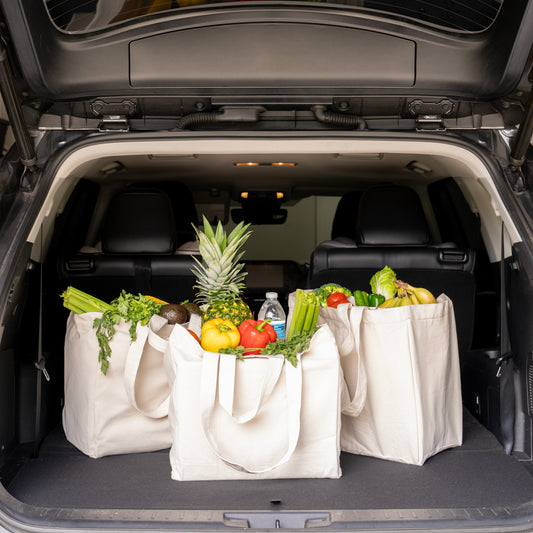
-
Canvas Grocery Tote with Drawstring
Regular price from $16.99Regular priceSale price from $16.99Unit price per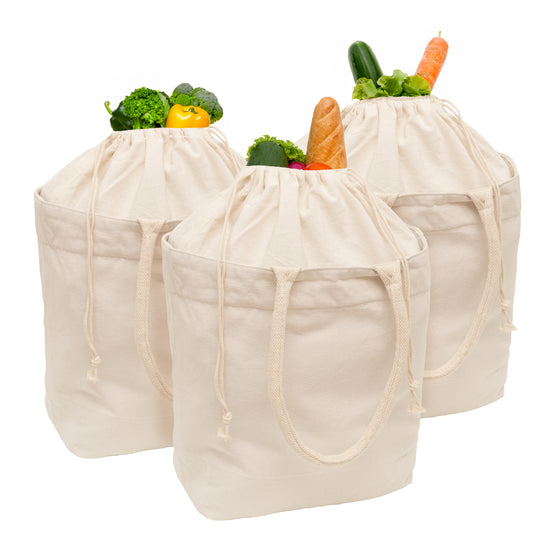
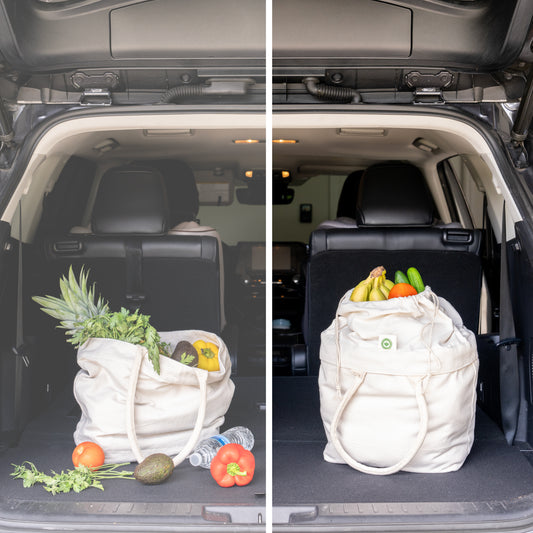
-
Mesh & Fabric Tote Bag
Regular price from $9.99Regular priceSale price from $9.99Unit price per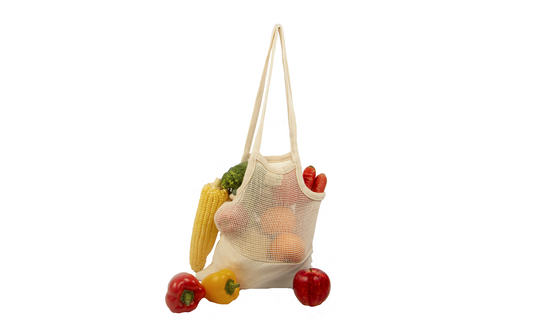
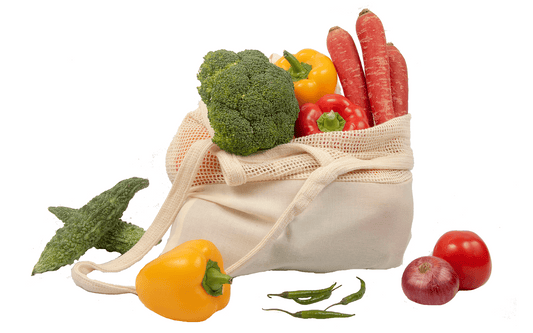
-
Mystery Item
Regular price $5.00Regular priceSale price $5.00Unit price per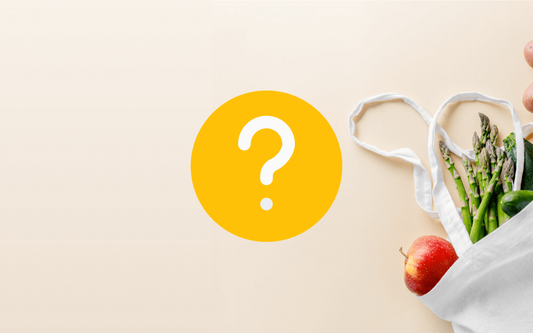 Sold out
Sold out

Reusable Grocery Tote Bags
Reusable grocery bags are exactly what they sound like; bags that you can reuse every time you go grocery shopping. These bags work to minimize the amount of single-use plastic bags that are commonly found in stores across the world.
The rise of reusable grocery bags shouldn’t come as a surprise. It wasn’t until the 1980s that single-use plastic bags became the norm. Nowadays reusable grocery bags are a simple way for consumers to start reducing their waste.
Reusable grocery bags are also compliant with environment-friendly legislations passed by various Counties and States to limit the usage of plastic bags.
Why should we avoid single-use bags?
Single-use plastic bags are quickly destroying the environment. Derived from fossil fuels, simply the production of these bags is harmful to the planet. These bags are often mistaken for food by birds, turtles, and fish. This transfers the plastic up the food chain to larger mammals, and can easily kill them, disrupting the entire ecosystem.
Plastic bags continue to pollute the planet long after they are used by people. Since plastic bags are synthetic, it can take up to 1,000 years for them to decompose. Instead, these bags break down into microplastics that continually pollute the environment.
In the United States alone, an average of 100 billion plastic bags are used each year. Creating this many bags requires 12 million barrels of oil, negatively impacting the planet. But, there is a simple solution to this problem.
What can we do to minimize this waste?
The simplest way to minimize this waste is to use reusable grocery bags. Rather than grabbing multiple plastic bags every time you go grocery shopping, opt for reusable bags that you can use time and time again. An easy solution to a complex problem.
Why Reusable Grocery Bags Are Better?
Reusable grocery bags can help your environmental conscience feel more at ease, but they also offer a number of other benefits, including:
-
Cost Savings: Cotton tote bags are often bigger and far more well-constructed than plastic tote bags. That means you can carry more items in fewer bags, which saves you money if stores are going to start charging anywhere from 5 to 10 cents per bag. Plus, if you purchase three reusable bags, those three bags are going to last a long time, so you are saving on the number of plastic bags you need for one shopping trip as well as for all of your future shopping trips.
-
Simple Storage: You probably have at least one cupboard or drawer in your home that is a disaster to open because of all the plastic bags that come billowing out at you when you do. There’s a simple solution: instead of accumulating a hundred plastic bags, you could have three or four reusable grocery shopping bags. They fold down easily, so it’s virtually impossible for them to take up an entire cupboard, and because they fold down so easily, they can also be stored right where you need them—in the glove box or trunk of your car, in your purse, or in your coat pocket. Tuck a couple away in those places and you’ll never have to worry about forgetting your reusable tote—and you’ll free up a whole cupboard’s worth of space.
-
Washable: The nicest thing about reusable cotton tote bags is that they are washable and clean up easily. Just throw them in with your towels once a week and your shopping totes will be ready to go the next time you are, no matter what you carried—or spilled—in them earlier.
-
Organization: We’ve already mentioned that reusable cotton tote bags can carry more things than plastic shopping bags, but our reusable canvas totes go one step above. They actually have sleeve compartments in them, so you can separate your items. That means you have a space to put the eggs so they can be transported more safely, or you have compartments to pack the things you might need to access right away so you don’t have to rummage through 10 plastic bags trying to find them. Organized storage is always far more efficient, and it’s no different with reusable shopping totes.
-
Easy to Carry: We’ve all been there. You bought too many groceries and now you have to get them home. Let me introduce you to the most painful handles you could ever imagine: plastic bag handles. Give yourself 10 minutes to get the circulation back into all your fingers, and then take a look at the handles on our cotton grocery bags. Not only are they a lot less likely to break and leave your eggs in a shattered heap of despair, but they are also wider, they distribute weight more evenly, and they are way less likely to cause you to lose a pinky.
-
Increased Durability: Of course, the handles aren’t the only things to break easily on plastic bags. Most are made with such thin plastic it’s a wonder they can hold a bag of chips. Introduce a cucumber or a couple of jars of pasta sauce into the mix and you’ve got a recipe for having to chase a few tumbling tomatoes across the parking lot. Cotton tote bags are made of much stronger materials, and they are designed to hold up against even the most ferocious vegetables.
-
Quality Fabric: Our reusable cotton tote bags are made from 100% certified organic cotton. That means they are biodegradable, so even if you end up throwing one away in the future, you don’t have to worry about it taking 400 years to break down. It really is a green item; however, that isn’t the only benefit. It is also proven that food keeps better in 100% cotton than it does in plastic, so your fruit and veggies will actually stay fresher during their transport than they otherwise would.
-
Fashion: The best thing about our reusable grocery bags is that they come in a number of different styles. You can buy the traditional reusable shopping bag style, or you can be as on-trend as you like with a mesh tote or mesh satchel. Whether you want to use your bag as a grocery tote, a gym bag, a beach bag, your go-to mall bag, or an everyday bag, or you want to get a few to match your outfit styles, our catalog has something for you.
Factors to Consider When Purchasing Reusable Grocery Bags
With so many reusable bags on the market, it can be overwhelming to decide what to get. Everyone’s grocery bag needs may be different, so here are a few factors to consider before you purchase your next bag:
-
Reusability
Look at the longevity of a bag. Will it last 5 uses or 500? Kraft paper bags are great, but they may begin to break after a few uses. On the other hand, a cotton bag can last for years at a time. When deciding how much to spend on a bag, don’t forget to consider how long the item can be used. Spending a little more money on a bag that will last you decades is worth it.
-
Heavy Duty and Weight Withstand Capability
Whether you’re loading up your bag with cartons of ice cream or a plethora of vegetables, it needs to be durable. Some bags can only handle a small amount of groceries while others seem to have no limit. Natural fibers like cotton and jute hold up well to common wear and tear and are often easier to repair.
-
Washability
Let’s be honest, groceries can be messy. Spilled milk or crushed bananas can happen, leaving your bags filthy. Picking a bag that can be washed helps cleanup become easier. When wet, a Kraft paper bag becomes useless. For washability opt for a bag made from natural or synthetic fibers such as cotton and nylon.
-
Foldable and Easy to Store
Ask yourself which bag feels the most convenient. Foldable and compactable grocery bags may be easier to store and carry around. Also, look for bags that fit your changing needs. Always carry a water bottle with you? Look for a bag that has a water bottle holder. Like to use your bag as a purse? Look for a bag that has a zipper compartment for your wallet and keys.
-
Versatile Uses
Think about purchasing a bag that is versatile. Who says a grocery bag can’t also be used for heading to the beach or out on a picnic? The more versatile a bag you have, the more likely you are to use it regularly.
-
Environmental Impact
Be sure to consider the environmental impact of the bag you are purchasing. While some synthetic materials may be lightweight and durable, they are also created by fossil fuels. Natural fibers have far less of an impact on the planet and if taken care of, can last for decades.
-
Biodegradable
Bags made from natural fibers ensure your bag is biodegradable. Double-check to make sure these bags aren’t made with a blend of synthetic and natural fibers. Bags made with synthetic materials can last for hundreds of years, turning into microplastics and disrupting delicate ecosystems.
-
Upcycling
One way to minimize the environmental impact of a bag is to choose a bag that can be upcycled after it's torn or used. For example, bags made from cotton can be used as cleaning rags in your kitchen or garage after they have torn.
Types of Reusable & Washable Grocery Bags Available
So you’re ready to start using a reusable bag, but may still be wondering where to begin. As reusable bags become more popular, more types of bags are coming onto the market. Let’s break down some of the most common types of bags:
Reusable Cotton Grocery Bags
When it comes to reusable grocery bags, cotton bags are the best, and here is why.
In recent years, cotton tote bags have become far more popular. These durable bags are made from either virgin or repurposed cotton and can often withstand a heavy load of groceries. Cotton bags have also become popular for brand marketing, with many companies printing their logo on the side of them.
-
Reusability: Cotton grocery bags are some of the most reusable bags on the market. When taken care of properly, and made well, these bags can last users decades. Different styles of cotton tote bags can serve different grocery needs.
-
Durability: High-quality cotton bags are extremely durable. The cotton straps are often able to withstand heavy loads of groceries. The double stitching on the straps and around the base is common ensuring they can withstand common wear and tear.
-
Washable: These bags can be washed by spot cleaning or in a washing machine. Hand-drying cotton bags can help extend their life. This is the only type of bag on the list that can be put in a standard washing machine.
-
Convenience: Along with being durable and washable, cotton bags are foldable and so convenient to carry. These bags are lightweight and a few bags also have a zipper and various other compartments to easily organize your shopping list. This variety of bags may be more convenient for everyday use.
-
Versatility: Cotton bags are extremely versatile. Tote-style bags are commonly used as a replacement for a purse. Those with zipper tops or pockets can also be used for picnics or days at the beach. There are other types of cotton bags including the ones made of mesh fabric which are stylish and extremely versatile.
- Environmental impact (biodegradable, upcycled): Organic cotton bags have a lower environmental impact than standard cotton. Because they are made of natural fibers, if the bags are disposed of properly, they can biodegrade when they are no longer usable. Some cotton bags are made from repurposed cotton material. Since many cotton bags have a logo printed on them, users should ensure it was printed with a natural dye in order to make them fully biodegradable.
Reusable Jute Grocery Bags
Like cotton bags, jute bags are made from biodegradable materials. Jute, a thicker version of burlap, can be cut into strips and woven into a sturdy reusable grocery bag. These bags are resistant to wear and tear, with some bags also being waterproof.
-
Reusability: Jute bags can last users for a couple of years when taken care of properly. High-quality jute bags may be slightly more expensive than other materials, but they will be worth the investment based on how long they last.
-
Durability: The natural fibers used to make jute bags are resistant to common wear and tear. The strong fibers allow the bags to hold a decent size load without the straps ripping. But you will need to be careful with a really heavy load as it is prone to easily tear.
-
Washable: Jute bags are not machine washable, however, they can be spot washed with warm soap and water. The bags should be left to air dry after washing them in the sink. Warm soap and water are usually enough to get out a spill or stain.
-
Convenience: Though jute bags are reusable and durable, they may not be the most convenient option. Bags of this material can’t compact down to a smaller size. Lack of zippers or smaller compartments makes them less convenient than a cotton bag.
-
Versatility: The natural woven fiber used to make jute bags make them incredibly versatile. Jute bags are great for a picnic or day at the beach. The natural fibers allow sand to slip through and not get stuck in the bag. Plus, some jute bags are waterproof in case the ground is wet or it begins to rain.
- Environmental impact (biodegradable, upcycled): The environmental impact of a jute bag is relatively low. Made from natural fibers, the bags will biodegrade at the end of their life. Producing jute bags is not very resource-intensive, and they are often regarded as having the lowest impact of reusable bags on the market.
Nylon and Polyester Grocery Bags
Both nylon and polyester are synthetic materials commonly found in reusable grocery bags. Though these bags are often lightweight and compactable, their non-biodegradable material makes them difficult to dispose of. Nylon and polyester are also commonly found in clothes.
-
Reusability: The reusability of a nylon or polyester bag depends heavily on the quality of each bag. Some styles can last for many years while cheaply made ones may begin to rip after a few uses, making them unsuitable for grocery shopping.
-
Durability: Some nylon and polyester bags are extremely durable, while others may begin to rip after just a few uses. When buying a synthetic bag, users should opt for the highest quality they can afford. This style of bag often lacks a flat bottom, causing all of the groceries to fall on top of one another, resulting in the bag ripping more easily.
-
Washable: These bags can be spot washed with warm water and soap but cannot be put into a washing machine. Getting a stain out of these bags can be difficult compared to a bag made from natural fibers. The sooner a stain is cleaned, the more likely it is to come out of nylon and polyester bags.
-
Convenience: One of the major draws of these bags is how convenient they are. They often compact down to a small size allowing them to be thrown into a purse or even a pocket. Many of these bags don’t have multiple compartments to separate groceries.
-
Versatility: Like other factors, the versatility of these bags relies on the overall quality of each bag. Most nylon and polyester bags are not extremely durable, making them less versatile for multiple uses. These bags may rip when brought to the beach or on a picnic walk.
- Environmental impact (biodegradable, upcycled): Nylon and polyester bags have a rather negative environmental impact. Synthetic material is derived directly from fossil fuels, which is less than ideal for a bag that is meant to help the environment. These bags are often made from virgin material, meaning it was produced merely to create the bag.
RPET Grocery Bags
RPET bags are made out of recycled plastic bag materials and so they are not perfect when it comes to environmental impact. These bags are often waterproof and help keep single-use plastic out of landfills. Many rPET bags also have a zipper at the top, making them more versatile.
-
Reusability: RPET bags are some of the most reusable synthetic bags on the market. Made of higher quality material, these bags can last for many years when they are taken care of properly.
-
Durability: These bags often mark the highest quality of synthetic bags. Reinforced straps and a wide flat bottom allow them to withstand heavy loads of groceries. These bags are built to last common wear and tear.
-
Washable: RPET bags can be spot cleaned but not put into a washing machine. The fabric on the outside of the bag usually requires warm soap and water in order to remove a spill or stain. For insulated bags, the inside lining of the bag can be wiped down with a wet cloth.
-
Convenience: Though durable, these bags often aren’t the most convenient to use. The bags may fold down into a smaller size but still usually can’t fit into a purse or pocket. The lack of multiple compartments also makes them less convenient to use than other types of bags.
-
Versatility: The standard rPET bag isn't particularly versatile. However, insulated rPET bags are extremely versatile. The insulation and zipper top helps make them an ideal bag for going to the beach or picnic, helping keep items warm or cold.
- Environmental impact (biodegradable, upcycled): Made from recycled plastic water bottles, these bags have less of an environmental impact than virgin synthetic bags. While the impact is still greater than bags made from natural fibers, rPET bags help minimize plastic waste that has already been created. Buyers should double-check to ensure these bags aren’t made with virgin plastic water bottles.
Kraft Paper Grocery Bags
Kraft paper bags are commonly found in grocery stores, offering an alternative to single-use plastic bags. While these bags are less harmful to the environment, they can only be used a few times. Continual use often results in the bag ripping.
-
Reusability: Kraft paper bags are not very reusable. These bags often only last for a few loads of groceries. The paper material can be reused as wrapping paper or for other crafting projects.
-
Durability: Paper bags are not a durable option for grocery shopping. Since they are made of paper, the bags will rip when wet, essentially making them worthless. They are best used for dry boxed items.
-
Washable: Kraft paper bags are not washable in any way. If the bag is spilled on it will most likely break past the point of repair.
-
Convenience: Found at most grocery stores, paper bags are convenient to use if you forget to pack your other grocery bags. Because of their low durability, they are not convenient to use for purposes other than groceries.
-
Versatility: The lack of durability makes these bags rather un-versatile. If the bags are still intact then can be used to store items or transport them from one destination to another. These bags would not hold up well if used for a picnic or day at the beach.
- Environmental impact (biodegradable, upcycled): Some paper bags are made from recycled paper, helping minimize their environmental impact. Though they are made from natural fibers, Kraft bags lack durability, meaning they can only be used a few times. A more sustainable option would be investing in a reusable bag that can last for decades.
Ready to start making a difference? Check out Our Reusable Cotton Grocery Bags
If you are in the market for an opportunity to save the environment, why not do so by shopping for something you are going to love to use every day? Take a look at our catalog to view our versatile selection of reusable shopping bags. We offer fast shipping and a satisfaction guarantee on all our items—that’s how much we know you’re going to love them.

















